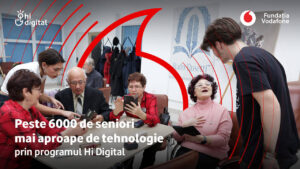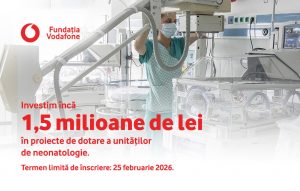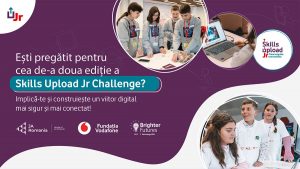A school principal and several citizens from Priponeşti struggle to improve the conditions for the village’s students.
by Medeea Stan
At the Middle School in Priponeşti, Galaţi County, during the break before the last hour, around 1 PM, a small student, with a track-suit blouse and brunette hair, washes her hands with green liquid soap, in the bathroom sink. As she moves her hands under the tap, she splashes around, and she gets chilly and shakes her arms. After she’s done, she leaves the bathroom with her palms on her cheeks and says: „Oh, my, I’ve washed with cold water”. Two girls are walking along the narrow hallway, and one of them stops and says suddenly: „I’m going to the bathroom!”. Going to the bathroom that was built in the school eight years ago, but has only had a plumbing system and running water since August 2015, is still a reason for excitement among the students.
Last summer, the Priponeşti Initiative Group was funded, at the initiative of the school principal, Daniel Botezatu, who proposed to the Foundations PACT and Vodafone România the project „Water for the Future”. This is how they received RON 31.500 for digging a drinking water well, a resource which would be unavailable to the entire Priponeşti Commune, if it weren’t for the fountains and springs. The region includes three villages, and in Priponeşti, there’s the Mayor’s office, the central clinic, the police station and the central school.
Botezatu, a 41 year old man, with his hair in a tail, has only been principal for two years. He heard from the previous management and other teachers that, when the bathroom was built, the contractor also wanted to dig a well for water, but the mayor refused, claiming that he would build a water and sewage system for the entire commune. For the school yard well, Botezatu contacted a company in Galaţi and explained to the workers that the money cover the drilling for a depth of 55 m. The workers promised him that, if needed, they will dig even deeper. After approximately 30 m, they reached the underground water and they kept going.
Nine months ago, the children were using the yard toilets, located some 100 m from the main building. During the main break, after having their milk and croissant, they had no place to wash their hands, as the nearest water source was a spring, some 150-200 m away. Washing in the school yard, during could days, would freeze their hands. Usually, they gathered around plastic bowls and poured water to one another. For drinking or washing fruit, they would bring water from home, in bottles of up to one litter, which would barely fit into their packed backpacks.
The 5th grade son of Nicoliţa Doru, an elementary school teacher from another locality, would sometimes leave home in a hurry, in the morning, and forgot to take wet wipes or a 0.5l water bottle, which she could barely stuff into the backpack weighing over three kilograms. The mother was worried that her son would get sick if he ate with his hands dirty. During the parents meeting, when the principal told them about the project, Doru was not confident that he’d see it completed, as the community had debated this issue before.
While there was money from the Mayor’s office, the school management signed a contract with a company that brought water for a water dispenser. The old toilet in the school yard involved significant expenditures, as, three or four times a year, the doors were stolen and had to be replaced. There was a time when they would find the windows broken after the weekend, but the funds were not enough to hire security. „The Mayor’s office provides a budget that you must stretch until the end of the year. If you change the windows three times, you have to cut back on other things. Like detergent, for instance. But there are certain utilities that you can’t cut back on, because they will disconnect the power”, Botezatu explains.
After the bell rang, and the children took out their lunch packs from their backpacks, there was a strong smell of ethyl alcohol in the classrooms. In order to protect them from germs, some parents would buy wet wipes or antibacterial gel. However, not all families could afford such items. The community is rather poor, only a few children have financially stable parents. „Financially stable means that both parents are employed, having a salary of RON 1500 each. And maybe they also have a small land lot, with an orchard or vinery”, Botezatu says. There are poor residents, but most of them live off agriculture: they have one or half a hectare, some have animals. Others live off benefits.
Day by day, the commune’s residents carry water from wells and springs and the running water is available only to those who have dug their own wells. Only a few of the students have bathrooms at home, but usually, the toilet is in the yard. This is why some of the children are not yet used to flushing. The Initiative Group’s project „Water for the Future” has also included hygiene education classes held by the teachers and the commune’s doctor, who told them about the importance of water for human health. In turn, the biology and geography teachers spoke to children about the role of water in the human body and nature. Out of the school’s 130 students, from infant class, to 8th grade, the 6th graders attended in larger numbers, as they had in their schedule the optional class Health Education.
Magdalena Agache, the school secretary, has two children, also in 5th grade. Before having a functional bathroom, because they heard in school about the project, the kids would ask here when they will have water. The family lives 10 minutes from the school, but the students found it hard to carry water with them. They would take one 0.5l bottle each or the boy would take a 1l bottle. Agache recalls that, during the first day when they were also allowed to go to the bathroom in school, the students would form lines at the entrance. „They would sometimes go when they don’t have something to do there, they play”. So far, there’s been only one incident: they put the sink plug, and the sink filled up with the water, that flooded the bathroom.
The students are glad that during this summer, they did not have to go to the bathroom in the yard toilet. Elena, an 8th grader with long, black hair, recalls that the boys used to hit the girls with snowballs when they would come out. She didn’t find it easy to maintain a proper hygiene either: „We used to wash with wet wipes or bring water in bottles”. Cosmin, her colleague, says that, after the water installation was completed, the family physician came to the classes and patiently told them about the risks they face unless they follow hygiene rules. He was not aware how dangerous it was to not be able to wash your hands and he didn’t always take water with him – sometimes he borrowed some from his colleagues –, as the walk from his home to school is about 2 kilometres. Others are glad to have running water, because this makes work a lot easier for them when on duty. „It’s a lot easier for us to rinse the sponges, we don’t have to go outside to wet them. Our hands would kind of freeze up”, says Vasile, an 8th grader a bit stressed out of the days when he had to carry more water to school just to wipe the blackboard after each class; during the math class, he’d have to go several times.
In the school yard, surrounded by a small wire mesh fence, during the gym class, the students move their arms around while slowly moving towards the teacher. The old doorless toilet is still in the picture. The school still has other needs, such as heating and the playground, yet the water was and remains the most important. „Now I see that they find reasons to go to the bathroom and wash their hands all the time. This makes me happy”, Botezatu says. The next step for the Initiative Group in Priponeşti will be to seek funding in order to install a hot water boiler inside the school.
This material was drafted in partnership with Decât o Revistă within the funding round Involved in My Community, which is part of the Investment Program for the Rural Area, conducted by the Vodafone România Foundation and the PACT Foundation. You can find more stories of involvement on the platform oameniisudului.com developed by the PACT Foundation.












